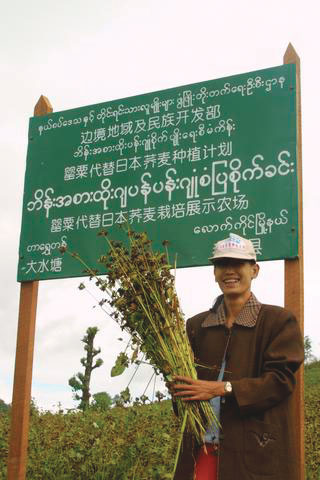Japan's Official Development Assistance White Paper 2005
Main Text > Part II ODA DISBURSEMENTS IN FISCAL YEAR 2004 > Chapter 2 Details and New Policies about Japan's ODA: Striving for Further ODA Reforms > Section 2. Measures for Each of the Priority Issues > 3. Addressing Global Issues > (8) Drugs
(8) Drugs
The drug problem is a serious global issue that must be addressed through enhanced, coordinated efforts of the international community. In recent years in the Asian region, particularly in the "Golden Triangle," 38 the problem of synthetic drugs has worsened and smuggling by international drugs syndicates has become even more sophisticated. The impact of drug problems such as narcotics on Japan is incalculable. Drugs pose a direct threat to people's lives and livelihoods, and also pose the danger of undermining the future of the international community. Against this background and from the perspective of human security, Japan is placing importance on tackling the drug problems in the international community, including narcotics, and is supporting anti-drug measures implemented under international cooperation involving related international organizations.

Crop substitution to begin cultivation of Japanese buckwheat for the sake of eliminating poppy (Myanmar)
As for bilateral assistance, Japan is providing support to prevent drug-related crimes and enhance regulatory capabilities in regions where drugs that are supplied to Japan are being illegally manufactured. At the same time, taking into account the poverty issue associated with drug problems, Japan is providing assistance through NGOs and alternative development projects to help the residents of these countries overcome poverty so they will not have to rely on the cultivation of poppy and other plants used to manufacture drugs. In FY2004, Japan implemented the Drug Control Regional Cooperation Project, based in Thailand, to assist Thailand and its surrounding countries (Cambodia, Laos, Myanmar, and Vietnam) to improve their drug analysis technology and regulatory capabilities that would utilize the analysis results. Seminars and other agendas on drug control and drug analysis were held in each country and trainees were accepted to receive training in Japan. Furthermore, the "Technical Cooperation Project on Drug Enforcement" is being implemented to help improve drug control capabilities as part of the program to assist in the reform of Indonesian National Police, as well as the "Capability Enhancement for Drug Law Enforcement" to improve drug control capabilities of the Philippine Drug Enforcement Agency ( PDEA ).
Moreover, Japan is an active participant of international conferences such as the United Nations Commission on Narcotic Drugs ( CND ). In addition, Japan annually contributes funds to the United Nations International Drug Control Programme ( UNDCP ) Fund, which is managed and operated by the United Nations Office on Drugs and Crime ( UNODC ). In FY2004, Japan contributed approximately US$3.04 million. Utilizing these funds, assistance was provided for projects such as enhancing crackdown on illegal drug trafficking at national borders of Southeast Asian countries; providing training on methods for analyzing confiscated drugs, particularly amphetamine-type stimulants; developing the agricultural communities in Myanmar to stop their dependence on poppy cultivation; and enhancing drug control capabilities in China. Furthermore, Japan provided assistance through the Trust Fund for Human Security to "Drug Abuse Counseling, Treatment and Rehabilitation Services in Cambodia," a project implemented by UNODC, to respond to the threats that rapidly increasing illegal drug abuse and the sharing of drug needles and related activities, pose on the community.


 Next Page
Next Page